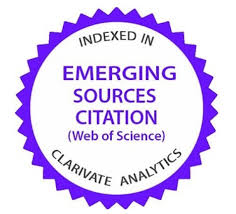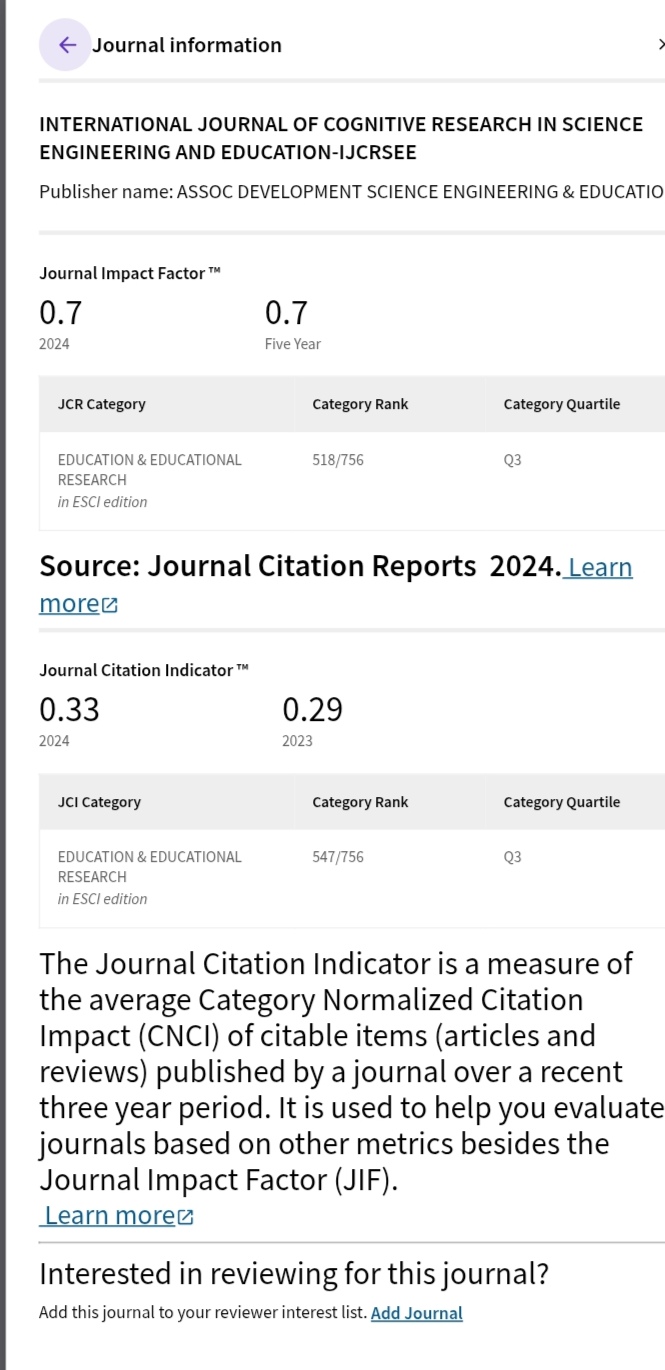SOME METHODOLOGICAL ASPECTS OF THE EVALUATION OF STUDENTS’ EDUCATIONAL ACHIEVEMENTS AT UNIVERSITY
DOI:
https://doi.org/10.5937/IJCRSEE1701043GKeywords:
Evaluation, Activity Approach, Contextual Approach, Students, UniversityAbstract
The article deals with some methodological aspects of evaluation of students’ educational achievements at university. Evaluation being as an essential component of the educational process includes controlling, measurement and assessment. Studying the methodological aspects of evaluation, we refer to the activity and contextual approaches. Activity approach involves using of the active forms and methods of evaluation, such as web-quests, discussions, presentations of the projects, portfolio, etc. Contextual approach allows to organize the evaluation of students’ educational achievements, providing the professional activities, which help them to master their skills. The author concludes that the use of contemporary forms of evaluation in the educational process of the university will contribute to the effectiveness of the educational process itself.
Downloads
References
Agapova, O.I., Shvets, V. I., Verbitsky, A. A. (1987). Implementing of System and Contextual Approach. Issues of Hight School. Moscow, 47-55. (in Russian).
Asmolov, A.G. (2009). System and Activity Approaches in the Development of a New Generation of Standards. Pedagogy, 18-22. (in Russian). Retrieved from https://elibrary.ru/item.asp?id=12785913
Balzer, L. (2006). Wie werden Evaluationsprojekte Erfolgreich? Ergebnisse Einer Delphistudie [How are evaluation projects successful? - Results of a Delphistudy]. Weinheim, 123-135. (in German). Retrieved from http://www.lars-balzer.info/publications/pub-balzer_2006-03.html
Balzer, L. (2013). Bekanntheitsgrad und Nutzung der Evaluations-Standards der Schweizerischen Evaluationsgesellschaft (SEVAL) sowie erste Modifikationshinweise: Ergebnisse der Mitgliederbefragung. LeGes - Gesetzgebung & Evaluation, 24(2), 439-458. (in German). Retrieved from http://www.lars-balzer.info/publications/pub-balzer_2013-07_LeGes2013-24(2)_balzer.pdf
Balzer, L. (2015). Evaluation Jugendprojekt LIFT III, 2014. Abschlussbericht. Zollikofen: Eidgenössisches Hochschulinstitut für Berufsbildung EHB IFFP IUFFP, 16. [Evaluation Youth project LIFT III, 2014. Final report. Zollikofen: Swiss Federal Institute of Vocational Education and Training EHB IFFP IUFFP, 16.] (in German). Retrieved from http://www.lars-balzer.info/publications/pub-balzer_2015-03_LIFTIII2014-Abschlussbericht.pdf
Balzer, L., Renold U., Frey, A., Nenniger, P. (2002). Reform der Kaufmännischen Grundausbildung. Band 3: Ergebnisse der Evaluation [Reform of Basic Commercial Training in Switzerland]. Results of Evaluation, Volume 3. Landau, 230. (in German). Retrieved from http://www.lars-balzer.info/projects/projekt_rkg.html
Gowin, D. B., & Millman, J. (1981). Toward Reform of Program Evaluation: Lee J. Cronbach, SR Ambron, SM Dornbusch, RD Hess, RC Hornik, DC Phillips, DF Walker, and SS Weiner. Educational Evaluation and Policy Analysis, 3(6), 85-87. doi:10.3102/01623737003006085, Retrieved from http://journals.sagepub.com/doi/abs/10.3102/01623737003006085
Davydov, V. V. (1972). Types of Generalization in Training (Logical and Psychological Problems of Constructing Subjects). (in Russian). Retrieved from http://edu-lib.net/drugoe-2/davyidov-v-v-vidyi-obobshheniy-v-obuchenii
Davydov, V. V. (1981). The Category of Activity and Mental Reflection in the Theory of A. N. Leontiev. Soviet Psychology, 19. (in Russian).
Davydov, V. V., Zinchenko, V. P. and Talyzina, N. F. (1982). The Problem of Activity in the Works of A. N. Leontiev. Soviet Psychology, 21. (in Russian). Retrieved from http://www.voppsy.ru/issues/1982/824/824061.htm
El’konin, D. B., Davydov, V. V., Zinchenko, V. P. (1989). Selected Psychological Works. (in Russian). Retrieved from http://fusionpiter.ru/articles/elkonin-chosen-works
Galperin, P. Y. (1999). Introduction to Psychology: Textbook for High Schools. (in Russian). Retrieved from http://pedlib.ru/Books/3/0297/3_0297-1.shtml
Galperin, P. Y., Talyzina, N. F. (1979). The Modern Theory of Stage Formation of Mental Actions. (in Russian).
Galustyan, O. V. (2014). Application of Case Study in E-Learning. Distance and Virtual Education. (in Russian). Retrieved from https://elibrary.ru/item.asp?id=21752697
Galustyan, O. V. (2015). Digital Campus as Electronic Image of the University. Rupkatha Journal on Interdisciplinary Studies in Humanities, 7(3). Retrieved fromhttp://rupkatha.com/V7/n3/28_digital-campus.pdf
Kromrey, H. (2003). Evaluation in Wissenschaft und Gesellschaft [Evaluation in science and society]. Zeitschrift für Evaluation, 1, 93-116. (in German). Retrieved from http://www.hkromrey.de/Kromrey_EvalWissG.pdf
Larionova, O. G. (2005). Competence as a Base of Contextual Learning. Higher Education in Russia. 10, 118-122. (in Russian). Retrieved from https://elibrary.ru/item.asp?id=9574028
Lektorsky, V. A. (2008). Activity Approach: Beginning and Prospects. Bulletin of Tomsk State Pedagogical University. 1, 13-16. (in Russian). Retrieved from https://elibrary.ru/item.asp?id=11621284
Leontiev A. (1976) Signs of Connectivity and Integrity of the Text. Semantic perception of speech communication (within conditions of mass communication) Science. P. 46-47. (in Russian).
Levina, M. M. (2009). Activity Approach as a Methodological Principle of Management of Educational Process of Students. Teacher Education and Science, 2. 4 - 13. (in Russian). Retrieved from https://elibrary.ru/item.asp?id=17062047
Rubinstein, S. L. (1989). Fundamentals of General Psychology. Pedagogy. (in Russian). Retrieved from http://elib.gnpbu.ru/text/rubinshteyn_osnovy-obschey-psihologii_t1_1989/go,0;fs,1/
Schedrovitsky, G. P., Kotelnikov, S. I. (1983). Educational and Business Games as New Form of Organization and Method of Collective Thinking Activity. Innovations in Organizations. 43. (in Russian). Retrieved from http://www.fondgp.ru/lib/collections/archive/online/83c
Slobodchikov, V.I. (1998). Psychological Problems of Formation of the Inner World of Man. Questions of Psychology. (in Russian). Retrieved from http://www.voppsy.ru/issues/1986/866/866014.htm
Stošić, L. (2015). The importance of educational technology in teaching. International Journal of Cognitive Research in Science, Engineering and Education (IJCRSEE), 3(1), 111-114. Retrieved from https://ijcrsee.com/index.php/ijcrsee/article/view/166
Stosic, L., & Stosic, I. (2013). Diffusion of innovation in modern school. International Journal Of Cognitive Research In Science, Engineering And Education (IJCRSEE), 1(1), 5-13. Retrieved from https://ijcrsee.com/index.php/ijcrsee/article/view/7
Verbitsky, A. A. (1990). Person in the Context of Speech: Forms and Methods of Active Learning, 64. (in Russian).
Verbitsky, A. A. (1991). Active Learning at High School: Contextual Approach. (in Russian). Retrieved from http://www.twirpx.com/file/580876/
Verbitsky, A.A. (1995). Independent Work of Students: Challenges and Experience. Higher Education in Russia. 137-145. (in Russian).
Verbitsky, A. A., Dubovitskaya, T. D. (2003). The Contexts of Educational Content. (in Russian). Retrieved from https://elibrary.ru/item.asp?id=19878704
Verbitsky, A. A. (2004). Competence Approach and the Theory of Contextual Learning. (in Russian). Retrieved from http://pedlib.ru/Books/7/0163/7_0163-1.shtml
Verbitsky, A. A., Larionova, O. G. (2006). Humanization and Competence: Context of Integration. (in Russian). Retrieved from https://elibrary.ru/item.asp?id=18696804
Verbitsky, A. A., Zhukova, N. V. (2006). Problems of Humanization of Education within a New Educational Paradigm. (in Russian). Retrieved from https://elibrary.ru/item.asp?id=19982931
Verbitsky, A. A., & Kalashnikov, V. G. (2012). Category of «Context» and contextual approach in Psychology. Psychology in Russia: State of the art, 5. (in Russian). doi:10.11621/pir.2012.0007 Retrieved from http://psychologyinrussia.com/volumes/index.php?article=1122
Wottawa, H., Thierau, H. (2001). Evaluation. Pädagogische Psychologie [Evaluation. Educational Psychology]. Bern: Hans Huber. (in German). Retrieved from http://tocs.ulb.tu-darmstadt.de/114351554.pdf
Zaporozhets, A. V. (1986). Selected Psychological Works: Mental Development of a Child. Pedagogy, 2(1), 321. (in Russian). Retrieved from http://www.koob.ru/zaporozhets/psy_works_1
Zaporozhets, A. V. (1986). Selected Psychological Works: Development of the Voluntary Movements. Pedagogy, 2(1), 297. (in Russian). Retrieved from http://www.twirpx.com/file/1412472/
Published
How to Cite
Issue
Section
License
Copyright (c) 2017

This work is licensed under a Creative Commons Attribution-NonCommercial-NoDerivatives 4.0 International License.











